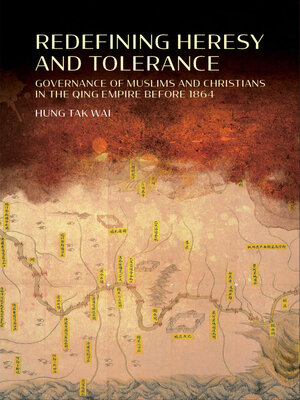Redefining Heresy and Tolerance
ebook ∣ Governance of Muslims and Christians in the Qing Empire before 1864
By Tak Wai Hung

Sign up to save your library
With an OverDrive account, you can save your favorite libraries for at-a-glance information about availability. Find out more about OverDrive accounts.
Find this title in Libby, the library reading app by OverDrive.



Search for a digital library with this title
Title found at these libraries:
| Library Name | Distance |
|---|---|
| Loading... |
In Redefining Heresy and Tolerance, Hung Tak Wai examines how the Qing empire governed Muslims and Christians under its rule with a non-interventionist policy. Manchu emperors adopted a tolerant attitude towards Islam and Christianity as long as political stability and loyalty remained unthreatened. However, Hung argues that such tolerance had its limitations. Since the mid-eighteenth century, the Qing court intentionally minimised the importance of the Islamic identity. Restrictions were imposed on the Muslims' external connections with Western Asia. The Christian minority was kept distant from politics and the Han majority. At the same time, Confucian scholars began to acquire a new understanding of religion, but they were not encouraged to get in touch with the Muslims and Christians. This book demonstrates how, from the late eighteenth to the early nineteenth century, the Qing government prevented Confucian scholar-bureaucrats from interfering in the religious life of Christians and Muslims, and how the Confucians' understanding of 'religion' was reshaped during the implementation of such policy in the period. This book reveals that a different kind of 'religious tolerance' had already emerged among Sinophone intellectuals before their contact with the West.







